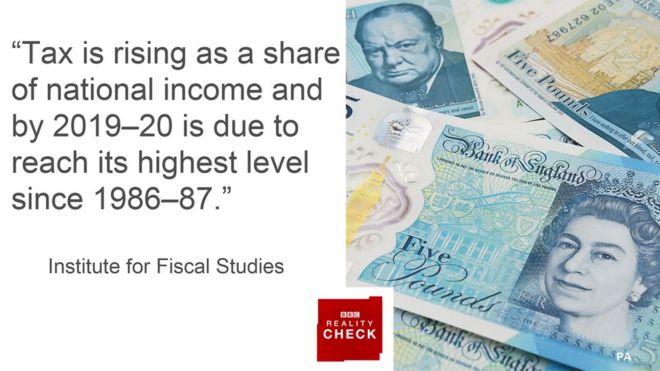 The claim: Taxes could rise to their highest level as a proportion of national income since 1986-87 by 2019-20.
The claim: Taxes could rise to their highest level as a proportion of national income since 1986-87 by 2019-20.
Reality Check verdict: The Office for Budget Responsibility (OBR) forecasts suggest taxes could actually reach that level as soon as 2017-18. That may not happen if changes are made in this week's Budget and it is only a forecast, so unexpected events could prevent it happening.
The Institute for Fiscal Studies said in its Green Budget that tax is rising as a share of national income and by 2019-20 is due to reach its highest level since 1986-87.
It is important to stress that it is not saying taxes on all individuals or households are going up. The measure it is using is the government's total tax receipts (and the OBR's forecasts of those receipts) as a proportion of gross domestic product (GDP), which is the total amount of goods and services produced by the economy.
We will examine which taxes have been rising later, but it is true that the total take is expected to rise in the next few years to levels unseen since the mid-1980s.
It is in the next financial year, 2017-18, that the OBR expects the big jump in receipts to 36.9% of GDP, which take it above the peaks of 2011-12. Indeed it appears to be that year and not 2019-20 that first takes receipts to 1986-87 levels.
But it does not mean that everybody is paying more tax.
There have been gradual falls in revenue from income tax, for example, as the amount people have to be earning to pay it has been increasing.
The government said in the Autumn Statement that the increases in the basic rate threshold in the last parliament had meant four million of the lowest-paid people were not paying it at all.
Revenue raised by selected taxes
As a percentage of GDP
In addition to the taxes included on this chart are fuel duty, which has fallen gradually as successive governments have frozen it, and VAT, which got a boost when the government raised it from 17.5% to 20% at the start of 2011, but has been pretty constant since.
The category of tax that has been rising strikingly and is mainly responsible for the increase next year is "other".
That includes the new dividend tax regime, the increased insurance premium tax and a higher rate of stamp duty land tax for second homes.
But all of the forecasts for the coming years are from the OBR and are based on how things stood at the time of the Autumn Statement.
All this could change in Wednesday's Budget.
No comments:
Post a Comment